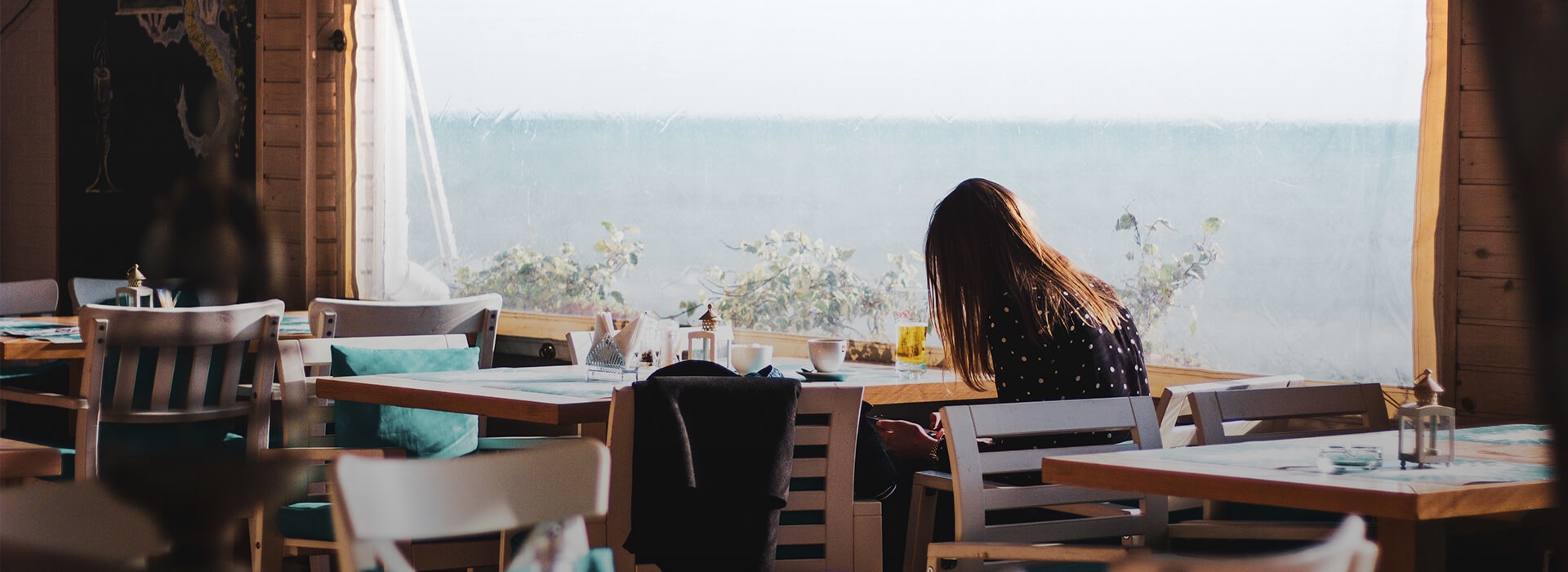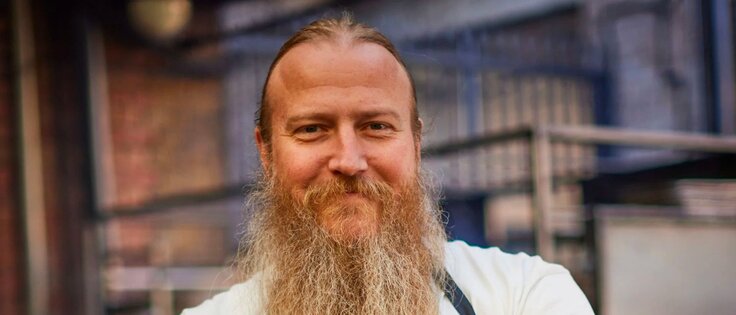
Article
5 min read
How centering your business around health can drive wealth
Kitty Finstad
Nov 8, 2023
What's on the menu?

Andrew Clarke of Acme Fire Cult.Copyright Planday 2023
Meet the team
- Who: Andrew Clarke
- Role: Chef, consultant and podcaster
- Business: Acme Fire Cult
- Where: East London
That serves up
- A focus on wellbeing
- A desire to do things differently
- A talking culture, to cut down on burnout
How healthy is your business? Sure, customers want free-range eggs, hand-dived scallops and certified cruelty-free hotel toiletries. But what about your staff?
Absences are at an all-time high. And mental-health issues awareness is more important than ever. How can hospitality owners and managers take care of their people as much as their ingredients and amenities? Especially during busy times when stress is higher and seasonal illnesses are just waiting for their next vulnerable host body…
So what makes a happy, healthy hospitality workplace?
Fun!
Andrew Clarke doesn’t just cook outdoors on fire. Or reduce waste by turning by-products into ferments. He’s on a mission to create an environment where people enjoy coming to work, have fun and share that experience with guests at his East London restaurant, Acme Fire Cult.
How do Andrew and his team keep the fun flame alive? With a holistic approach to wellbeing – and leading by example. In his 25+ years in kitchens, this straight-talking chef has picked up some valuable lessons about what does and doesn’t contribute to a healthy workplace where people turn up rested and ready to go. Here he shares some of his observations.
What staff really want isn't complicated
It all starts with Abraham Maslow’s hierarchy of needs. The pyramid-shaped model of human development from the 20th-century psychologist asserts that personal achievement, progress and ultimate happiness are non-starters without a solid foundation. So, basic needs – food, water, shelter, safety – are often taken for granted. But they’re the only things people can focus on when they don’t have them.
For Acme Fire Cult staff – many just starting out and facing inflated London rents – money isn’t a "motivator". It's critical for living and working in the capital. When asked about what the new generation of hospitality workers really wants, Andrew is quick to answer:
“Money. And sometimes that’s it. And there are really good reasons for that, including the cost of living, especially in London. People need money just to be here."
“We tried other staff incentives, like monthly yoga sessions. That started well, but I feel like it became problematic for staff – we didn’t want to put pressure on people to have to do yoga and have it become a sort of enforced wellness – that can become toxic.”
Hospitality is hard work. Don’t make it harder
“I spent some of my formative years in basement kitchens where you’d turn up at 7.30am – totally dark in the winter – and you might not leave until 11 or 11.30pm. If you’re lucky you might nip upstairs around midday for a cup of tea while the kitchen’s washed down for lunch service. You don’t see the sun.”
It's not exactly the same as going down the mines, but lack of daylight is known to have detrimental effects on physical and mental health. Decreased sunlight, especially during the winter months, can disrupt the body’s internal clock and trigger depression.
Through his charity campaign Pilot Light, co-founded in 2016 with fellow chef Doug Sanham, Andrew has spoken candidly on social media, at industry events and with other media about his own mental health issues. His aim was to raise awareness and provide support to hospitality colleagues struggling with mental health in a sector renowned for pressurised environments, long shifts, physically demanding work, late nights and bullying.
“There’s no dressing this up: hospitality jobs are difficult, and they’re not for everyone. And in my years of talking about mental health, what I was really saying is that when I suffered myself, I knew the reasons for it and I knew I had to fix them. What I shouldn’t have been doing is going out every night boozing and taking all sorts of drugs, hardly getting any sleep and wondering why I was on the backfoot for the rest of the week. When in fact we should all be treating ourselves like athletes – we exhaust ourselves in the same way but have very different lifestyles.”
These days, Andrew uses yoga and meditation to stay on form. And while Pilot Light has done a tremendous job in raising awareness among hospitality workers and employers, Andrew acknowledges that “a certain mindset” is crucial for longevity in the industry. So look after that mindset.
Planday’s shift scheduling software helps you understand how to optimise your staff and deliver the flexibility that improves mental wellbeing.
More talking, less burnout
As Andrew and Doug organically shared their experiences through Pilot Light, their voices became powerful tools for inspiring others.
“I hope that by telling our stories, we created a safe space and gave people the confidence to share their own stories.”
Over the years, other wellness and mental health campaigns, initiatives and charities (like Hospitality Action and The Burnt Chef Project) have emerged, allowing the pair to step back.
“It was actually beginning to take its toll on our mental health again,”
Andrew admits. Pilot Light served its purpose in raising awareness and successfully passed the baton to other organisations that can focus on those issues fully.
In its wake, Andrew and Doug have started the Skull Session podcast, where they discuss
“all the good things that we’ve brought into our lives”,
including what Andrew calls his ’12 pillars’ – things he absolutely needs in his life.
“When we were doing talks for people working in hospitality, we referenced these 12 pillars. Some of them are very basic, like sunlight, like eating well. Not drinking and taking drugs. Exercise, meditation. It’s a lot of common sense, really, what we human beings need. We can talk all day long about sustainable food. But if you’re working in a basement kitchen with little sunlight and minimal movement, that’s not sustainable.”
What is sustainable is continuing to talk, and Skull Session provides that platform, allowing Andrew and Doug to dig deeper into issues that matter and share them with others, providing a tonic to hard times.
“Given that there are fewer staff in the industry, I do think things are getting harder, because standards need to remain the same. Customers still want a plate of food for the same price they wanted it 20 years ago, and they want it quickly. We’re working to those deadlines and under those expectations – it’s tough. But if we can start telling people how to look after themselves to avoid burnout, it’s going to give them longevity in their jobs – and even probably in their lives. These are the important things that we want to be sharing now.”
Planday’s secure instant messaging helps you keep all your team on the same page, and creates a safe space from which you can talk to each other.
One last thing…
Food and hand hygiene is a given in hospitality, but what else can employers do to encourage physical health?
Scott Smith of Edinburgh’s FHIOR offers staff private health insurance. “It’s a cost, of course, but it means that people are more likely to make a doctor’s appointment if they’re unwell – and hopefully get well and come back to work more quickly.”
Centre your business around wellbeing
See how our shift scheduling software can help you give everyone the downtime they need to reach their full potential.
